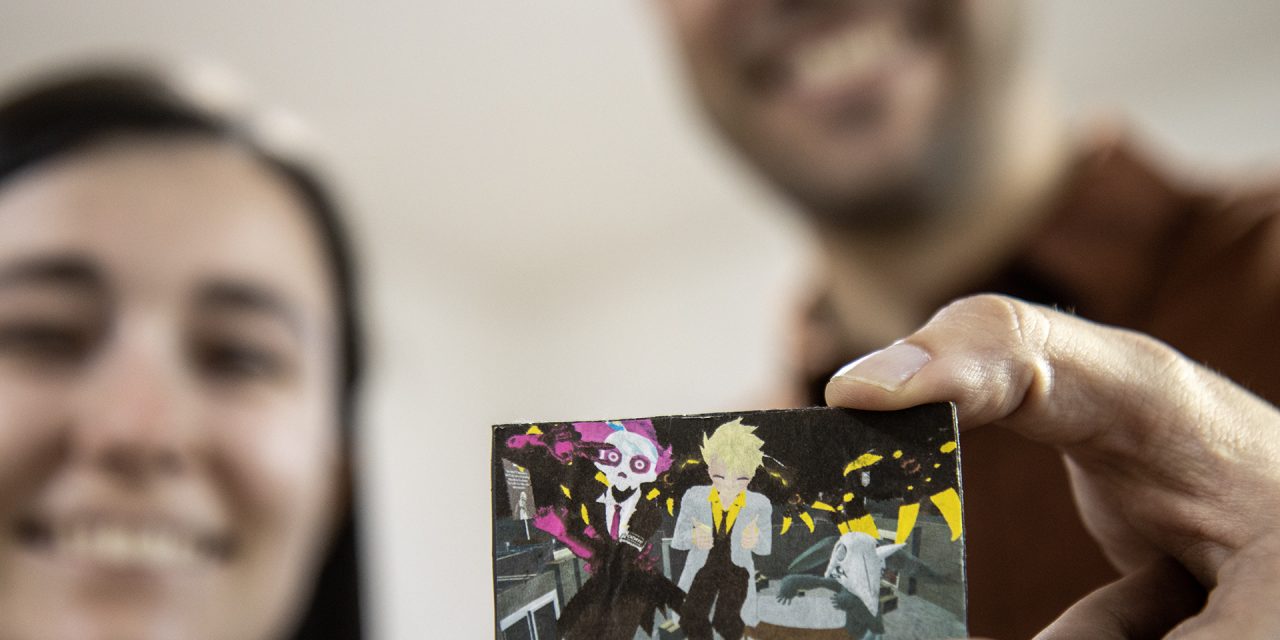Above: The very first picture Michaela and Justin Knippers took together was in the virtual reality world where they met. Michaela is a Nutella jar and Justin is the man in the gray coat. IMB Photo
EDITOR’S NOTE: This story contains the reality of Michaela’s past, including thoughts of suicide and mentions of excessive drinking.

Justin and Michaela Knippers serve as International Mission Board (IMB) missionaries in Japan. The couple met and fell in love via virtual reality. Now “in real life,” they share the gospel with others in the virtual world. IMB Photo
Lonely. Desperate. Drunk. Anxiety-ridden. It was a life Michaela knew all too well. Growing up she watched family members travel the exact road she was on. She wanted an escape.
So, the young woman turned on the computer and transported herself from an empty Tulsa apartment to a techno-colored virtual world. In this video game, she could be anyone or do anything she wanted. No one in real life would ever recognize her. Players are known by gamer names and choose an avatar to represent themselves as they move through virtual spaces.
Michaela designed her online persona to be trustworthy and funny, to ooze happiness. Even her avatar, a cartoon Nutella jar, portrayed her as nonthreatening and carefree. If she couldn’t be these things in real life, then she’d fake them in virtual reality (VR).
Only, it didn’t work.
“I thought everything would change. Instead, I made my own virtual prison,” Michaela said about the social withdrawal and reclusiveness she dug into. “I drank and partied with people online. I was sad and miserable.”
After her first session, Michaela logged off and collapsed on the floor crying. She contemplated killing herself as a better way to escape. But as it had every time, she planned to do this since the age of 10, a small inner voice urged her to keep searching for the solution to the hole in her heart.
The next day, Michaela logged onto the virtual game again. She searched for answers. When she didn’t find any, she joined a virtual party and got drunk. In real life this meant she was drinking at home … alone … in front of her computer. This became a daily pattern. As she drank, she hopped in and out of virtual worlds looking for people having fun just to taunt them. If she couldn’t have fun, then she’d keep others from it.
There was one group of friends, however, that didn’t get mad or fight back when she barged into their virtual meeting place. They were polite, and when they exited the room, one girl, called Silver, stayed to talk with Michaela. She invited the lonely Oklahoman to join their group. She explained a man called Dr.Tako led discussions about life and often helped them with problems.
“Hey, that’s the guy I just made fun of,” Michaela said.
“Yes!” Silver answered. “He made a safe space for people who are struggling.”
In this virtual space, Dr.Tako shared about Jesus.
Jesus in Virtual Reality
Michalea didn’t know or care much about Jesus. Living in the Bible Belt meant she knew a lot of people who said they were “Christian,” but whose lives seemed no different from her own. However, the thought of getting “free counseling” from this Dr.Tako character was enough to get her to show up online the next day. Besides, she thought, that small inner voice told her this guy might have the solution for the lostness she felt.
The first meetup started out like every other online experience for Michaela—people from all over the world drinking and doing things they wouldn’t do in real life. Then Dr.Tako logged in, and the countenance of the group changed. He didn’t condemn or look down on them. He talked to each person, joked around and prayed. When opportunities arose, Dr.Tako led the conversation to a story about Jesus.
For Michaela, this was a lone light in the darkness. When he offered biblical wisdom for handling life situations, she paid attention.
“This dude was really wise,” Michaela admitted. “I’d been playing video games for a while, and no one ever talked about Jesus or the Bible.”
Evangelism isn’t common within the video gaming community. If not for a classroom challenge, Dr.Tako— Justin Knippers in real life—might never have shared the Gospel with this group.
A student at Southwestern Seminary in Fort Worth, Texas, Knippers used this virtual reality game to relax after a full day of classes, work and study. One night his missions professor, Mike Morris, asked a question that echoed in his heart: “Are you sharing the Gospel with people you come in contact with every day?”
Justin spent a few hours playing VRChat, a virtual reality game, each day, yet he’d never really shared about Christ’s sacrificial love in the direct way his professor suggested. That night, he logged on with a purpose and immediately met a guy who lived thousands of miles away. The new friend was looking to “trauma dump,” to share his real-world problems. Justin listened and then asked if he could pray. The man readily agreed.
When Justin logged off, he fist-pumped the air and exclaimed, “YES! It worked.”
The seminary student began practicing lessons about evangelism and missions in his virtual world each night. He even got his professor to help troubleshoot and craft a strategy for sharing the Gospel. By the time Michaela bullied his character, Dr.Tako, Justin was well-versed in praying with people, planting quick seeds of the gospel and discipling in the virtual world.
He was ready for the day Michaela asked him to “tell me about the real Jesus from the Bible.”
In real life, the encounter looked surreal—Dr.Tako’s Japanese anime-like character talking to a cartoon Nutella jar about the gift of grace—but in the VR world, it was the solution Michaela had been searching for. For days, she asked questions and thirsted for answers.
One night, Michaela sat on her air mattress contemplating everything she had learned when a sense of being free from burdens and sin washed over her.
“Maybe I should accept Jesus,” she thought to herself. “I wonder who can help me with that?”
She messaged Justin.
IRL (In Real Life)
The next Sunday, Michaela sat in the parking lot of Tulsa, Southwood, apprehensive about entering. Justin coached her via phone to just open the door and go in. They had worked for days through virtual reality sessions on what to expect at church and what to say to the pastor. Justin knew it was important for “in real life” relationships and discipleship.
“It’s time to come out of the VR shell and go to a real-life church with believers who genuinely care about physical and spiritual well-being, not just digital emotions,” Justin explained.
Stepping into that church changed everything for the once introverted recluse. It took a little explaining for the pastor to understand Michaela had come to faith in Jesus over a video game. In fact, he double- and triple-checked to make sure she understood this decision. When he presented her to the church, they opened their arms, and Michaela found a family.
She soaked in everything about church and faith. Her knowledge of the Bible grew. Mentors at the church encouraged her to tag along as they ministered within the community and among internationals living in the neighborhood. Michaela no longer needed to pretend to be happy because she radiated joy in the Lord. She shared about God’s great love with everyone she met—whether in real life or virtual reality.
It was only natural for Michaela to partner in Justin’s fledgling virtual reality ministry. She would have joined him even if they hadn’t ended up falling in love and getting married. Neither will ever forget that behind every avatar is a real person who may be hurting and looking for a solution.
These “real people” are why the couple chose to be a steadfast missionary presence through digital innovations in tech-rich Japan. They recognize their unique interests and skills in gaming mean they might be the only ones to share the Gospel with those in the virtual world. So, they’ve committed to reach the lost, in the real and virtual world, no matter the cost.




